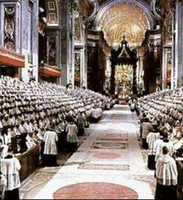Friday, September 22, 2006
 This section looks at the relationship between laity and the hierarchy. In this first paragraph, we see something post-Vatican II Catholics generally have no problem expressing, namely "needs and desires."
This section looks at the relationship between laity and the hierarchy. In this first paragraph, we see something post-Vatican II Catholics generally have no problem expressing, namely "needs and desires."
The laity have the right, as do all Christians, to receive in abundance from their spiritual shepherds the spiritual goods of the Church, especially the assistance of the word of God and of the sacraments (Cod. Iur. Can., can. 682.). They should openly reveal to them their needs and desires with that freedom and confidence which is fitting for children of God and brothers (and sisters) in Christ. They are, by un of tho knowledge, competence or outstanding ability which they may enjoy, permitted and sometimes even obliged to express their opinion on those things which concern the good of the Church (Cfr. Pius XII, Alloc. De quelle consolation, 1. c., p. 789: Dans les batailles decisives, c'est parfois du front que partent les plus heureuses initiatives..Idem Alloc. L'importance de la presse catholique, 17 febr. 1950: AAS 42 (1950) p. 256.). When occasions arise, let this be done through the organs erected by the Church for this purpose. Let it always be done in truth, in courage and in prudence, with reverence and charity toward those who by reason of their sacred office represent the person of Christ.
As with many human endeavors, reverence and charity is often missing from consideration. This has been pointedly true from both sides of the lay-clergy divide.
Just out of curiosity, what are the organs in your diocese for lay expression of guidance for the bishop?
The laity should, as all Christians, promptly accept in Christian obedience decisions of their spiritual shepherds, since they are representatives of Christ as well as teachers and rulers in the Church. Let them follow the example of Christ, who by His obedience even unto death, opened to all (people) the blessed way of the liberty of the children of God. Nor should they omit to pray for those placed over them, for they keep watch as having to render an account of their souls, so that they may do this with joy and not with grief.(Cf. Heb. 13, 17.)
Obedience: a difficult attitude for many of us to accept. It presumes, of course, a working organ for dialogue.
Let the spiritual shepherds recognize and promote the dignity as well as the responsibility of the laity in the Church. Let them willingly employ their prudent advice. Let them confidently assign duties to them in the service of the Church, allowing them freedom and room for action. Further, let them encourage lay people so that they may undertake tasks on their own initiative. Attentively in Christ, let them consider with fatherly love the projects, suggestions and desires proposed by the laity.(Cfr. l Thess. S, 19 et 1 lo. 4, 1.) However, let the shepherds respectfully acknowledge that just freedom which belongs to everyone in this earthly city.
The other side of the equation, of course, is the respect due the laity from the hierarchy.
Lastly, we have a final pull-together-for-the-team pep talk:
A great many wonderful things are to be hoped for from this familiar dialogue between the laity and their spiritual leaders: in the laity a strengthened sense of personal responsibility; a renewed enthusiasm; a more ready application of their talents to the projects of their spiritual leaders. The latter, on the other hand, aided by the experience of the laity, can more clearly and more incisively come to decisions regarding both spiritual and temporal matters. In this way, the whole Church, strengthened by each one of its members, may more effectively fulfill is mission for the life of the world.
Anybody getting the message yet?